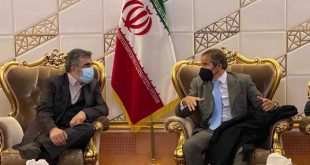A Pakistani court has granted the government three more days to find a way to clear a sit-in protest by a religious party near the capital, Islamabad.
Pakistani Interior Minister Ahsan Iqbal said in Islamabad on Monday that he had pleaded with the Islamabad High Court (IHC), warning that any use of force could cause “instability” in the country.
This came after the court warned authorities Monday to obey its order to shut down the protest, which has sparked widespread anger by virtually bringing the capital to a halt for two weeks. The court said it would hold officials in contempt if they did not launch a crackdown.
The government has continued to insist on negotiating with the demonstrators even after the court issued an order for the roads to be cleared by last Saturday.
“We want to resolve this issue immediately and peacefully. Pakistan cannot afford any unrest,” Iqbal told reporters. “The Islamabad administration did not conduct an operation against the protesters on my orders, because I do not wish for any unrest. I asked for an extension in the deadline so that we can find a solution.”
The deadline for ending the sit-in is now Nov 23, he noted.
“We are in talks with religious leaders and I believe we will convince the protesters to end their sit-in,” the minister said. “I am sure that in 24 hours or so, we will find a solution; there will be a breakthrough.”
This comes as roughly 2,000 protesters from the Tehreek-i-Labaik Ya Rasool Allah Pakistan group have blocked a main highway used by thousands of commuters since November 6, causing hours-long traffic snarls.
The protesters are demanding the resignation of federal law minister Zahid Hamid over a hastily-abandoned amendment to the oath election candidates must swear. Demonstrators say the amendment amounts to blasphemy — a highly contentious issue in Pakistan. The government puts the issue down to a clerical error.

Pakistan’s blasphemy law has become so sensitive, especially since 2011 when the governor of Punjab province, Salman Taseer, was shot dead by a bodyguard for questioning the law that mandates the death penalty.
Critics say Pakistan’s blasphemy law is largely misused, with hundreds of people languishing in jails under false charges. In most cases, even unproven allegations frequently stir mob violence and bloodshed.
The law has raised concerns among rights activists and some politicians who say it is often exploited by extremists or those who want to settle personal scores.
The developments come at a time when Islamabad is trying to tackle growing militancy, political instability and extremism in the country.
 WILAYAH NEWS VOICE OF THE GLOBAL AWAKENING
WILAYAH NEWS VOICE OF THE GLOBAL AWAKENING






